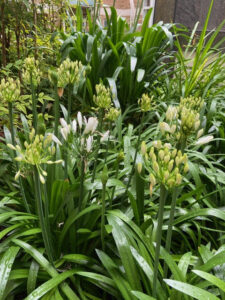 I was the youngest of three children, with two much older sisters. We grew up in a home of polar opposites. Our mother was open and communicative, encouraging me to be talkative and share my feelings, whereas my father was restrained, with a tendency to bottle things up and then suddenly explode. It meant the atmosphere was often fraught with undercurrents of tension. They bickered frequently and were rarely affectionate with each other. Our mother looked after us full-time while my father, who was in the RAF, commuted to work, so we didn’t see much of him. He’d arrive home after I was in bed and at the weekends he’d disappear into the garden, which he cultivated with a passion.
I was the youngest of three children, with two much older sisters. We grew up in a home of polar opposites. Our mother was open and communicative, encouraging me to be talkative and share my feelings, whereas my father was restrained, with a tendency to bottle things up and then suddenly explode. It meant the atmosphere was often fraught with undercurrents of tension. They bickered frequently and were rarely affectionate with each other. Our mother looked after us full-time while my father, who was in the RAF, commuted to work, so we didn’t see much of him. He’d arrive home after I was in bed and at the weekends he’d disappear into the garden, which he cultivated with a passion.
When I was 8, my father thought he was going to be posted overseas, so I was sent to school as a weekly boarder, going home at weekends. As it turned out, the posting never came through, but I loved the school so much that I asked if I could board full-time. It was a small school, really caring, with excellent teachers and I loved the sports on offer.
Life changed greatly at 13 when I moved to a different school to do my GCSEs and ‘A’ levels. I missed the supportive atmosphere I’d been used to and wasn’t prepared for being bullied by another boy for the rest of my school life. I confided in my housemaster who spoke to him, but it just made things worse. This coincided with a rocky patch in my parents’ marriage, during which my father left to live with my sister in London for six months. I didn’t feel I could share my own unhappiness with my parents when they plainly had their own problems, although I’m sure they would have stepped in if they’d known. Having spoken to my sister and mother since then, they both said my personality changed enormously in those last years at school – I transformed into an introverted, quiet and frightened boy.
I went on to University, mainly to fulfil my parents’ hopes for me, and afterwards I fell into a PR and Marketing career in the fashion sector in London. I still felt unhappy, so I was prescribed anti-depressants for a while. Although I wanted one-to-one therapy, my doctor couldn’t offer me that, so I did group therapy for two years. It didn’t really change much, but at least it gave me a safe space to express my feelings.
It was while living in London that I met my wife. I proposed after 18 months and we were really happy together. However, despite the fact we both wanted children, that didn’t prove an easy journey. In fact, after many years of trying, my wife did the Hoffman Process to help her come to terms with our situation.
 Looking back now, the turning point for me came when I was working for a large global fashion brand as Head of UK Marketing. After four years I was made redundant, when my role was transferred to the USA. Initially I felt upbeat – I was sure I’d find a new job quickly – but although I had lots of interviews, nothing concrete materialised. Over the next two years I got some marketing consultancy work and earned some extra money by gardening at a local nursery, which I discovered I really enjoyed. Also, to our delight, we had successfully added twins to our family – but my confidence was non-existent and I gradually slipped back into depression. I was angry at everyone and everything and hell-bent on self destruction.
Looking back now, the turning point for me came when I was working for a large global fashion brand as Head of UK Marketing. After four years I was made redundant, when my role was transferred to the USA. Initially I felt upbeat – I was sure I’d find a new job quickly – but although I had lots of interviews, nothing concrete materialised. Over the next two years I got some marketing consultancy work and earned some extra money by gardening at a local nursery, which I discovered I really enjoyed. Also, to our delight, we had successfully added twins to our family – but my confidence was non-existent and I gradually slipped back into depression. I was angry at everyone and everything and hell-bent on self destruction.
One morning everything came to a head – I walked over to my sister’s for a catch-up and just broke down and cried. We had a real heart-to-heart and the next day she rang and offered to gift me a place on the Process. Her husband, Dylan, had done the Process and both he and my wife encouraged me to go. I was initially reluctant as my previous therapy hadn’t helped, but supported by my wife, I finally decided to commit.
I remember feeling scared when I first arrived and was asked to hand in my phone. What followed was both life-changing and eye-opening. To say it took me out of my comfort zone was an understatement. The people on the course were from very different backgrounds, with a huge range of beliefs, ages and viewpoints and we all expressed our feelings openly. For the first few days, I didn’t think I’d last the course, but on the third day there was a moment when I recalled a sad time in my life and began to cry. It made me let go. I realised I felt safe to experience my feelings and from that moment on I was like a wilting plant that suddenly revived. I stopped resisting the Process journey and surrendered to the experience.
I realised that I’d been wearing different masks throughout my life, dependent on what I thought people expected of me. But for that week nobody expected anything – I just had to show up as me. It gave me nothing to hide behind. I saw something in me that I’d never seen before. I embraced new ways of opening up and talking to others at a different level. It was as if I had taken a backpack heavy with old feelings off my back and now stood three inches taller.
When I got home and sat down to dinner with my family, my 8 year old son looked at me and said, ‘Daddy, you’re different!’ I gave him a big hug. I realised he saw me as a different person and my wife could see the change in me too. Since then I can see I’m a much more present and supportive father to both my children, and my wife and I are a great team.
 Post Process, everything in my life has changed for the better. I’ve gone from having a ‘cup half empty’ to a ‘cup half full’ outlook on life. The vision I had on the Process of how I wanted my life to be was that my family would be central and that I’d extend my work into landscape gardening. I am so grateful for my Process experience.
Post Process, everything in my life has changed for the better. I’ve gone from having a ‘cup half empty’ to a ‘cup half full’ outlook on life. The vision I had on the Process of how I wanted my life to be was that my family would be central and that I’d extend my work into landscape gardening. I am so grateful for my Process experience.
My mother died during lockdown in 2020 and my father passed away just nine months later. During the period following my mother’s passing, I spent time with my father in his garden learning all I could from him about gardening, now I’d discovered that I shared his passion for it. He was wholeheartedly behind my ambitions and even now, when I’m working in the garden, I hear his voice in my head giving me advice. I’m sure he’d be proud of me and the direction my life has taken.
Even after all this time, my Process vision keeps unfolding. We’ve moved out of London and bought a plot of land in the country where we intend to build a house – somewhere I can expand my landscape gardening career. I’ve realised gardening isn’t just something I want to do, it’s something I must do. It’s key for me, emotionally and mentally, to work with the land that nurtures me. When I’m working outdoors, even if it’s raining or windy, I feel more present and alive. I’m now looking at gardens from a three or four year perspective, working with a purpose and for a long-term outcome. In the countryside the air is cleaner and there’s so much more green space. We already have cats and guinea pigs and are contemplating a dog. Being in an environment that’s full of life and visibly-changing seasons wakes me up and helps me see things differently.
My advice to anyone considering the Process? Throw caution to the wind and go. It will be unique and life-changing and you won’t regret it.
Thank you to Dan for sharing this Process Story. To find out more about Dan’s landscaping work, visit www.grownlandscapes.com






 Sign up to receive monthly newsletters from Hoffman
Sign up to receive monthly newsletters from Hoffman